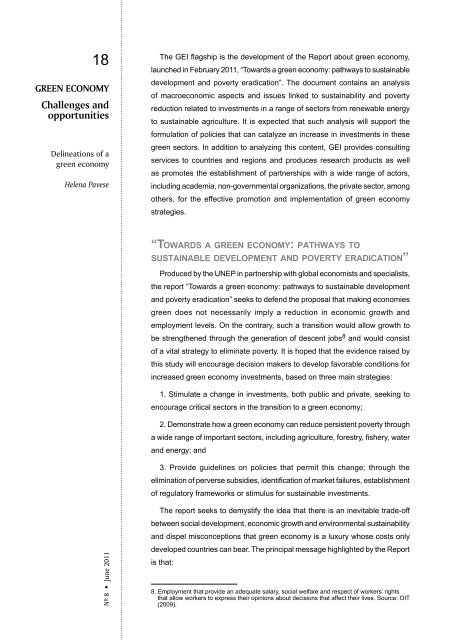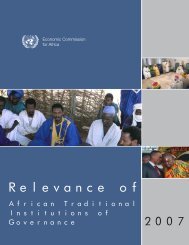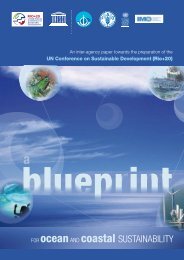Download Publication - Rio+20
Download Publication - Rio+20
Download Publication - Rio+20
Create successful ePaper yourself
Turn your PDF publications into a flip-book with our unique Google optimized e-Paper software.
18<br />
GREEN ECONOMY<br />
Challenges and<br />
opportunities<br />
Delineations of a<br />
green economy<br />
Helena Pavese<br />
The GEI flagship is the development of the Report about green economy,<br />
launched in February 2011, “Towards a green economy: pathways to sustainable<br />
development and poverty eradication”. The document contains an analysis<br />
of macroeconomic aspects and issues linked to sustainability and poverty<br />
reduction related to investments in a range of sectors from renewable energy<br />
to sustainable agriculture. It is expected that such analysis will support the<br />
formulation of policies that can catalyze an increase in investments in these<br />
green sectors. In addition to analyzing this content, GEI provides consulting<br />
services to countries and regions and produces research products as well<br />
as promotes the establishment of partnerships with a wide range of actors,<br />
including academia, non-governmental organizations, the private sector, among<br />
others, for the effective promotion and implementation of green economy<br />
strategies.<br />
“To w a r d s a g r e e n e c o n o m y: p a t h w a y s to<br />
s u s t a in a b l e d e v e l o p m e n t a n d p o v e r t y e r a d ic a t io n”<br />
Produced by the UNEP in partnership with global economists and specialists,<br />
the report “Towards a green economy: pathways to sustainable development<br />
and poverty eradication” seeks to defend the proposal that making economies<br />
green does not necessarily imply a reduction in economic growth and<br />
employment levels. On the contrary, such a transition would allow growth to<br />
be strengthened through the generation of descent jobs 8 and would consist<br />
of a vital strategy to eliminate poverty. It is hoped that the evidence raised by<br />
this study will encourage decision makers to develop favorable conditions for<br />
increased green economy investments, based on three main strategies:<br />
1. Stimulate a change in investments, both public and private, seeking to<br />
encourage critical sectors in the transition to a green economy;<br />
2. Demonstrate how a green economy can reduce persistent poverty through<br />
a wide range of important sectors, including agriculture, forestry, fishery, water<br />
and energy; and<br />
3. Provide guidelines on policies that permit this change; through the<br />
elimination of perverse subsidies, identification of market failures, establishment<br />
of regulatory frameworks or stimulus for sustainable investments.<br />
Nº 8 • June 2011<br />
The report seeks to demystify the idea that there is an inevitable trade-off<br />
between social development, economic growth and environmental sustainability<br />
and dispel misconceptions that green economy is a luxury whose costs only<br />
developed countries can bear. The principal message highlighted by the Report<br />
is that:<br />
8. Employment that provide an adequate salary, social welfare and respect of workers’ rights<br />
that allow workers to express their opinions about decisions that affect their lives. Source: OIT<br />
(2009).

















